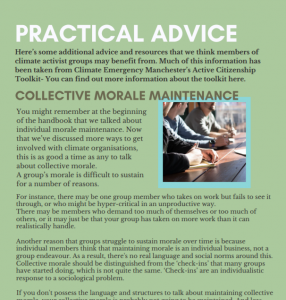
You might remember at the beginning of the handbook that we talked about individual morale maintenance. Now that we’ve discussed more ways to get involved with climate organisations, this is as good a time as any to talk about collective morale.
A group’s morale is difficult to sustain for a number of reasons. For instance, there may be one group member who takes on work but fails to see it through, or who might be hyper-critical in an unproductive way. There may be members who demand too much of themselves or too much of others, or it may just be that your group has taken on more work than it can realistically handle.
Another reason that groups struggle to sustain morale over time is because individual members think that maintaining morale is an individual business, not a group endeavour. As a result, there’s no real language and social norms around this. Collective morale should be distinguished from the ‘check-ins’ that many groups have started doing, which is not quite the same. ‘Check-ins’ are an individualistic response to a sociological problem.
If you don’t possess the language and structures to talk about maintaining collective morale, your collective morale is probably not going to be maintained. And low morale can be contagious. And this can lead to a very steep “death spiral” in a group.
Avoiding this starts with creating language and structure to maintain morale. If you are going to talk about the emotions in the group and the group’s sense of its own future, you need to do it on a regular basis. You need to do it non-tokenistically, so there is time to discuss the emotions, their implications, and to come up with possible solutions. You need a couple of people within the group who are sensitive to this and are willing to stick their heads above the parapet occasionally and say, “Yeah, I know that we were going to talk about x today, but I really feel from my sense of emails and conversations, that there are morale issues in this group that shouldn’t any longer be left, ignored or suppressed”, and then go from there.
Building Resilience and Creating Hope
Resilience is the capacity to cope with difficulties, and to be tenacious, despite setbacks. Building resilience takes a great deal of practice. The first step is to accept that there are no silver bullet solutions to the problems we face. Even if we had simple, clear solutions, they would surely be resisted by those who like or benefit from the current power structures. The fight for a better world is in essence, a struggle. It is difficult and demanding, and we will most likely spend our entire lives engaged in this fight. We’re in this for the long haul, and this is why we need to refrain from short-term thinking with regard to movements and activism. Both individual and group resilience are important to sustain your activism.
Is there reason to have hope for the future? You may have asked yourself this one or many times. Hope can often seem flimsy or unrealistic – after all, what’s the point of having hope for the future if hope does not translate into individual and collective action? It becomes important for you to reflect why (or whether) you need hope, and what hope helps you achieve. Alexandria Ocasio Cortez’s view of hope is particularly striking. She argues that hope is a discipline and a practice. You do not find hope, but you create it through your actions. And that’s how hope lives on.
Whether you think hope is necessary or not, it is worth reflecting on the reason that pushes you to engage in climate activism. Maybe your reason also changes over time. But returning to it during the bad days can be a helpful reminder on why you need to be a part of this larger-than-life climate movement, and why the movement in turn needs you.
You can download this section of the handbook as a pdf. You can also download the whole handbook as a single file (32Mb).
We intend to do another edition, so if you’ve found something wrong with this page, or you have comments, you can either leave a comment below, or else email us on studentclimatehandbook@climateemergencymanchester.net
If you like this handbook, and you’re reading this before November 10th 2020, and you live, work or study within Manchester City Council’s boundaries, please sign the petition for a seventh scrutiny committee, then share the petition with seven of your friends…
Navigation
Student Climate Handbook home page
